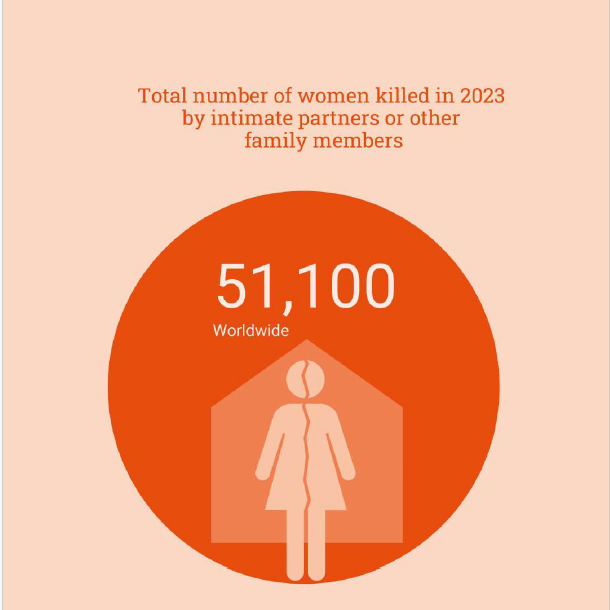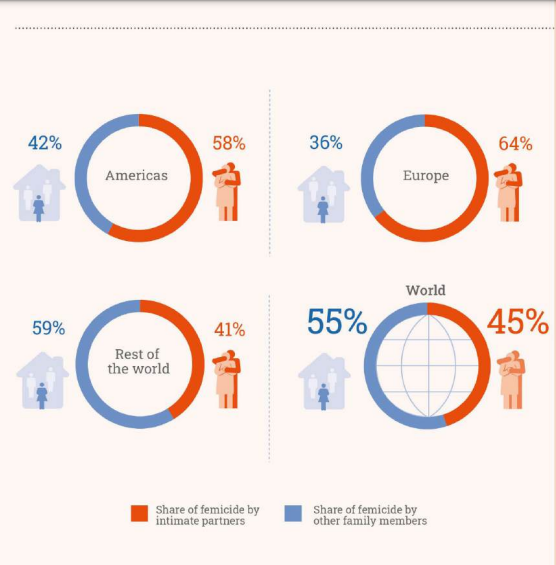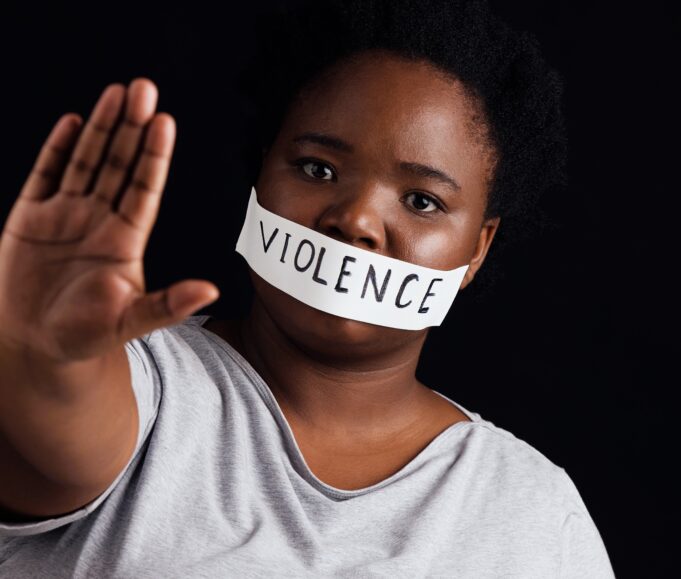In the time it takes you to read several articles in a newspaper or a few pages of a book or magazine, several women or girls have been killed by their intimate partner or a family member.
It happens every 10 minutes, according to a new UN report on femicides. According to a joint study by UN Women and the United Nations Office on Drugs and Crime titled “Femicides in 2023:
Global Estimates of Intimate Partner/Family Member Femicides,” the most severe manifestation of violence against women and girls—femicide—continues to be widespread across the world.
Globally, 85,000 women and girls were victims of deliberate homicides in 2023. Among these fatalities, 60 percent, or 51,100 deaths, were attributed to relatives or romantic partners. Data indicates that every day, 140 females are killed by someone close to them, which translates to one death occurring every 10 minutes.
“Violence against women and girls is not inevitable—it is preventable. We need robust legislation, improved data collection, greater government accountability, a zero-tolerance culture, and increased funding for women’s rights organizations and institutional bodies,” explained UN Women Executive Director Sima Bahous in a media statement.
Women in vulnerable situations, such as those who are displaced, affected by conflict or post-conflict environments, or experiencing poverty, face heightened risks. Public figures like female politicians, judges, human rights advocates, journalists, and others often experience disproportionate targeting through violent acts or threats.
These forms of aggression may include online abuse, harassment, and the spread of false information aimed at suppressing, frightening, or causing harm to these women.

On the recent 25th anniversary of the International Day for the Elimination of Violence against Women, themed “No Excuse,” world leaders and advocates gathered at the UN headquarters to highlight best practices to prevent violence against women, gaps and challenges, and the way forward.
“Horrendous sexual violence is being used as a weapon of war. And women and girls face a torrent of online misogyny. The situation is compounded by a growing backlash against women’s and girls’ rights.
Too often, legal protections are being rolled back, human rights are being trampled, and women’s human rights defenders are being threatened, harassed and killed for speaking out,” said UN Secretary-General António Guterres at the event.
Girls are exposed to specific dangers, such as early marriage, sexual exploitation, and mistreatment. Statistics show that nearly 25 percent of teenage girls who have been in romantic relationships have experienced physical, sexual, or psychological abuse from a partner before reaching the age of 19.
According to the United Nations, legislation plays a crucial role in mitigating violence against women and girls. Statistics show that nations with domestic violence laws in place experience lower rates of intimate partner violence (9.5 percent) compared to those lacking such legislation (16.1 percent).
Despite the global community’s insufficient allocation of resources to key actors involved in survivor support, there are encouraging signs at the national level. Countries are increasingly recognizing violence against women and girls as a priority area for investment.
The UN Spotlight Initiative to eliminate violence against women and girls focuses on prioritizing survivor-centered holistic support for survivors, including developing gender-responsive legal and institutional frameworks, strengthening the health sector and providing psycho-social support for survivors’ recovery as well as strengthening laws.
Deputy Secretary-General Amina J. Mohammed expressed the need to remember that “Each statistic is a person—often hidden by societal stigma, or silenced by fear. It is my personal conviction that the safe house we often take victims to, should actually be her remaining in her home and the perpetrator, the man, taken out.
Millions of women begin their days filled with trepidation—adjusting their daily routes, their clothing, their conduct, their decisions. Not out of choice, but out of necessity—to protect themselves.”
“Living under such constant stress and constraint stifles their freedom, creativity, and opportunities. It limits their access to education and employment and restricts their participation in public life. This does not only harm individuals.
When a significant portion of our population cannot operate freely or live without fear, the social and economic potential of communities, families and nations is diminished.”
Nearly one in three women experience violence in their lifetime. For thousands of women, the cycle of gender-based violence ended with one final and brutal act—their death by their partners and/or family members.
In the United States, Black and Indigenous women and girls are disproportionately impacted by violence and abuse. According to statistics from the Women’s Leadership and Resource Center at the University of Illinois Chicago on Black women’s experiences with domestic violence perpetuated by intimate partners, 54 percent have experienced psychological abuse.
Forty percent have experienced physical abuse, 9.6 percent have been raped and 91 percent of Black women killed, knew their killers. “In fact, murder by intimate partners is among the leading cause of death among young African American women between the ages of 15 and 45,” noted wirc.uic.edu.

According to the Indian Law Resource Center, “In the United States, violence against Indigenous women has reached unprecedented levels on tribal lands and in Alaska Native villages.
More than 4 in 5 American Indian and Alaska Native women have experienced violence, and more than 1 in 2 have experienced sexual violence.”
The law center also noted that, “Alaska Native women continue to suffer the highest rate of forcible sexual assault and have reported rates of domestic violence up to 10 times higher than in the rest of the United States.”
In the Nation of Islam, the role, value, and importance of women and girls is an integral part of what men, boys, women and girls are taught. Females in the Nation of Islam are encouraged to use their God-given talents, gifts and skills to the best of their abilities. The protection and safeguarding of women and girls is also taught.
In a message delivered on Mother’s Day, May 10, 2009, titled “The Immeasurable, Limitless Value and Beauty of a Woman,” the Honorable Minister Louis Farrakhan stated, “Women are devalued in this society.
It is heartbreaking to drive down certain streets in major cities and see beautiful women of every color, of every race, half nude and selling themselves to anyone who would purchase pleasure from them.”
The Minister continued, “Women have fallen so low, and it doesn’t seem that we, as men, care, because some will put our women up to this kind of behavior for the sake of money.”
“Once men are taught the knowledge of God, and the value of a woman, then men will kill to keep her safe! But because you don’t know her value, or yours, you play with her, devalue her, and laugh at her.”
“We believe in a more righteous value, evaluation of women,” Student Minister Jamil Muhammad, of Washington, D.C. told The Final Call.
“That thinking comes to us from the Honorable Minister Louis Farrakhan. If you understand the sacredness of the female and her value to the struggle of our people and the fact that no nation is judged by the men.
Nations are judged by the condition, the quality, and the women of that nation. Our girls should be educated and trained. They should be educated, of course, in their divine and spiritual education.
But they should also have a workable education to build nations, science, mathematics, engineering, the professions, and the humanities. When these things happen, then we can say we properly value our women,” said Student Min. Jamil Muhammad.
The Most Honorable Elijah Muhammad wrote about the protection, elevation and value of Black women in his book, “Message to the Blackman in America,” in the chapter titled, “The Black Woman.”
“Until we learn to love and protect our woman, we will never be a fit and recognized people on the earth. The White people here among you will never recognize you until you protect your woman.”
“The Brown man will never recognize you until you protect your woman. The Yellow man will never recognize you until you protect your woman. The White man will never recognize you until you protect your woman.
You and I may go to Harvard, we may go to York of England, or go to Al Ahzar in Cairo and get degrees from all of these great seats of learning. But we will never be recognized until we recognize our women,” wrote The Most Honorable Elijah Muhammad.













